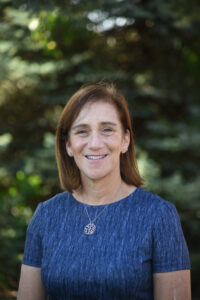By Sara Klein Wagner
I love how the Jewish calendar creates a rhythm and familiarity that adds meaning to our lives. The cadence and consistency of our holidays and traditions enrich us and our work. In Jewish communal life holidays are not simply a day off, but a resonant, multilayered centerpiece. Yet in the aftermath of October 7th, I cannot shake the feeling that this calendar has been forever changed. Now, Shemini Atzeret /Simchat Torah will be associated with the most brutal attack on Jews since the Holocaust. How this will become embedded in our story is yet to unfold as we have had time for reflection. We do know that the Yom Kipper War fifty years ago shares the name of the holiest day on our calendar.
In the space between Simchat Torah and the next holiday, Hanukkah, we as a people shared nine weeks of both internal and external pain and struggle. For more than two months we have been aware that all eyes are on the Jewish people more than ever before. Non-stop headlines, social media debate and protests abound. Real anxiety and an increase of antisemitism in North America has also prompted us to look inward as we acknowledge a renewed intensity of our Jewish connection. I have observed increased attendance at events and community gatherings. The most common refrain is that people just want to be together and not have to explain how they are feeling. I have also observed that the depth and level of dialogue is genuine and a sign that our community yearns to talk, to learn and to listen. As I have written before in this column, I am privileged to serve this Jewish community that I grew up in and I am humbled by the commitment, resilience, and compassion I witness every day. Those efforts have been undeniably significant. Our professional team has worked nonstop since October 7th addressing concerns about antisemitism, security, education, and led a campaign that has raised nearly $1.6 million to support humanitarian needs in Israel. That list grows daily. These tireless individuals have provided light for all of us during the darkest of moments.
We must remember that these darkest of times are neither the beginning nor the end.
This space, this moment as Elana Stein Haim wrote in the Times of Israel, Hanukkah as the Messy Middle:
“Hanukkah reminds us that miracles are possible and that seemingly unwinnable wars can be won. But it also holds lessons about partial victories, imperfect heroes, and incomplete belonging.
We tell the story of Hanukkah, in our liturgy and in our songs and in the rituals we use to celebrate the holiday, as the decisive end of a frightening conflict: the good guys win, the bad guys lose, and the Temple is rededicated with Divine imprimatur.
But that is not the full picture of how Hanukkah was experienced in its day: alongside the joy and triumph, there was loss, uncertainty, and ongoing strife. This reality of Hanukkah as the messy middle holds lessons of perseverance for us today, as we celebrate the holiday while the State of Israel fights a war which could last a long time, and whose outcome is unknown.”
Our tradition encourages questioning and debate. We are not all of one mind. In the lead up to their Hanukkah story, Jews did not agree on everything. Hanukkah is celebrated as a miracle, but at the time, it is likely that some members of the community grew closer after the Maccabees’ triumph, while others did not. We watched over the past year as Israelis filled the streets in protest over the proposed remaking of their judicial system. After October 7, divergent thoughts and perspectives remain, but for many, what mattered most was the imperative of unity. At this critical time in history, we don’t yet know how such renewed sense of belonging will transform our Jewish community. But I am hopeful that this renaissance of feeling part of a community — in learning from others and embracing our spirituality — will help us create what comes next.
Consider what we’ve accomplished amid this messy middle. In between holidays we have celebrated the release of captives; we have come together in communal gatherings; and we have supported Israelis with humanitarian aid. Meanwhile we are having vital conversations throughout our community, understanding that the days and weeks ahead will be difficult. We, too, are not immune from the tragedy of war. We mourn the innocent lives that were lost on October 7, for the trauma that will last for years for victims and their families, and we mourn the innocent lives lost in Gaza during the war with Hamas. This is not the end, and it is not the beginning of our story. It is part of our journey together as Klal Yisrael, the whole Jewish community.
Sara Klein Wagner is President and CEO of the Jewish Federation of Louisville and the Trager Family JCC




